Legal Aspects of Business: Law of Agency Report with Case Studies
VerifiedAdded on 2020/10/22
|10
|3018
|363
Report
AI Summary
This report provides a comprehensive overview of the law of agency, a critical aspect of business law. It begins by defining agency and outlining its key features, including the roles of agents and principals, the creation of agency through various means such as express and implied authority, and the types of agencies (universal, general, and special). The report delves into the different types of agent authority, differentiating between actual (express and implied) and apparent (ostensible) authority, and explores these concepts with reference to landmark case laws such as Freeman and Lockyer v. Buckhurst Park Properties Ltd. and Hely-Hutchison v. Brayhead Ltd. The report also examines the termination of agency contracts. The report helps students understand the legal obligations and relationships in business settings.
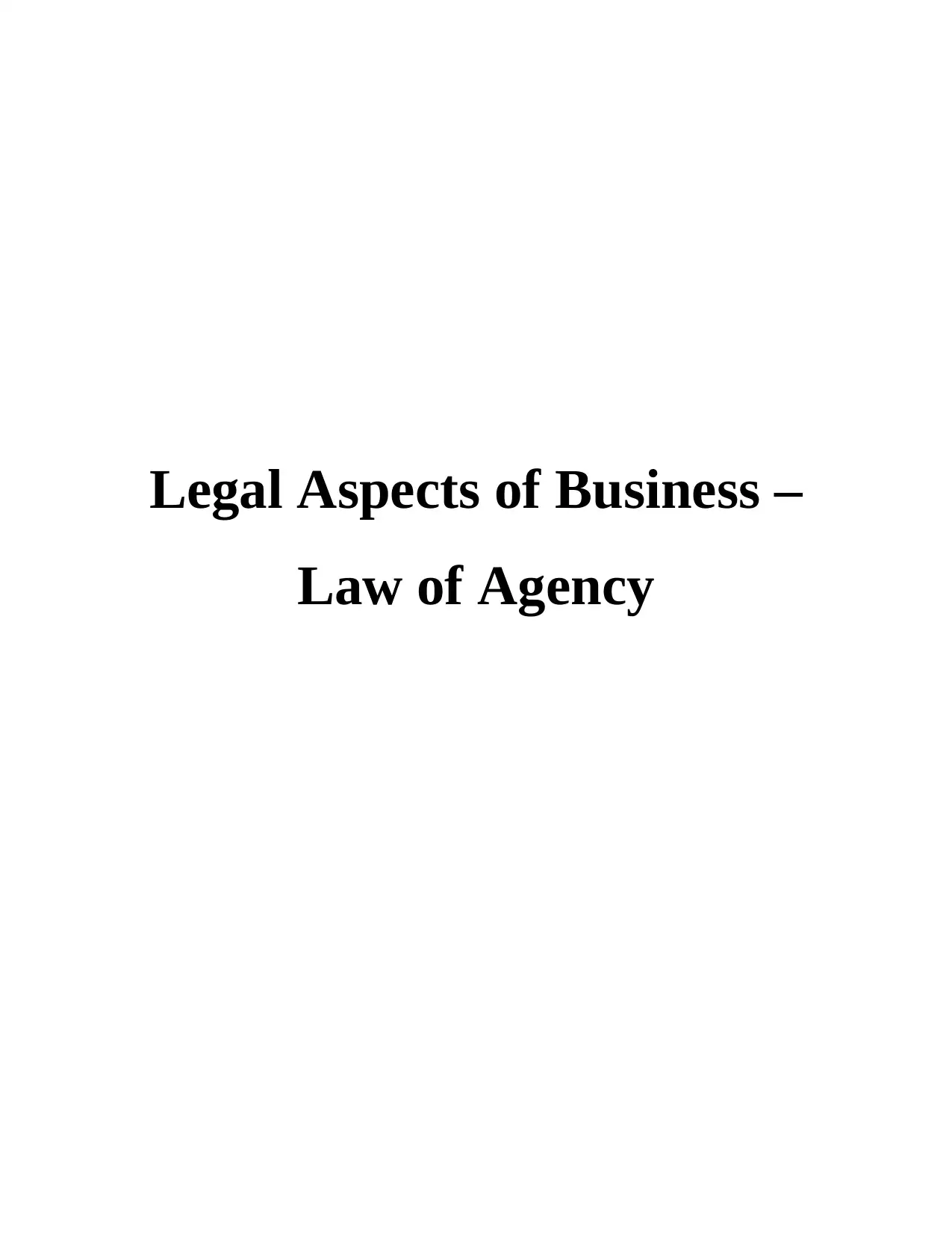
Legal Aspects of Business –
Law of Agency
Law of Agency
Paraphrase This Document
Need a fresh take? Get an instant paraphrase of this document with our AI Paraphraser
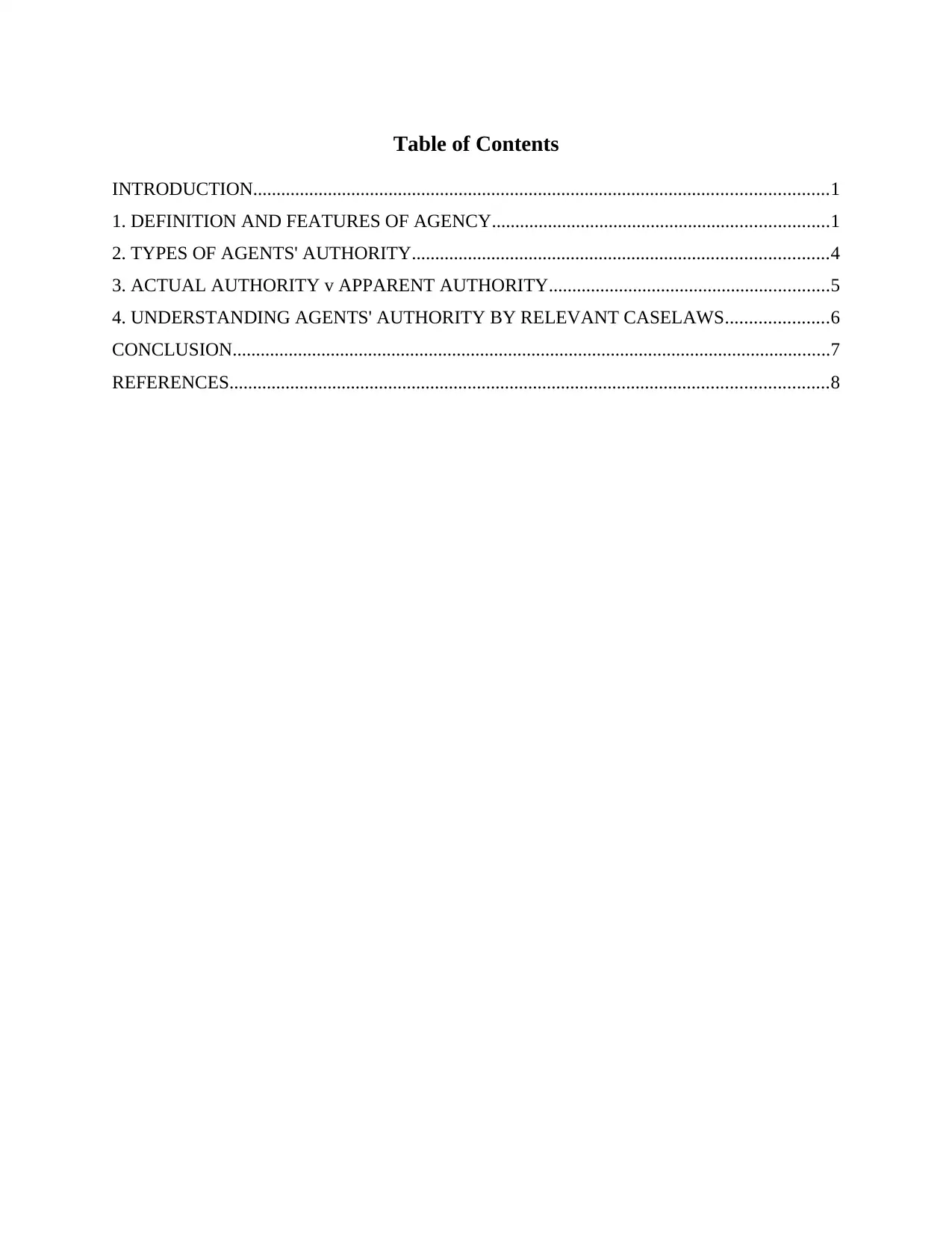
Table of Contents
INTRODUCTION...........................................................................................................................1
1. DEFINITION AND FEATURES OF AGENCY........................................................................1
2. TYPES OF AGENTS' AUTHORITY.........................................................................................4
3. ACTUAL AUTHORITY v APPARENT AUTHORITY............................................................5
4. UNDERSTANDING AGENTS' AUTHORITY BY RELEVANT CASELAWS......................6
CONCLUSION................................................................................................................................7
REFERENCES................................................................................................................................8
INTRODUCTION...........................................................................................................................1
1. DEFINITION AND FEATURES OF AGENCY........................................................................1
2. TYPES OF AGENTS' AUTHORITY.........................................................................................4
3. ACTUAL AUTHORITY v APPARENT AUTHORITY............................................................5
4. UNDERSTANDING AGENTS' AUTHORITY BY RELEVANT CASELAWS......................6
CONCLUSION................................................................................................................................7
REFERENCES................................................................................................................................8
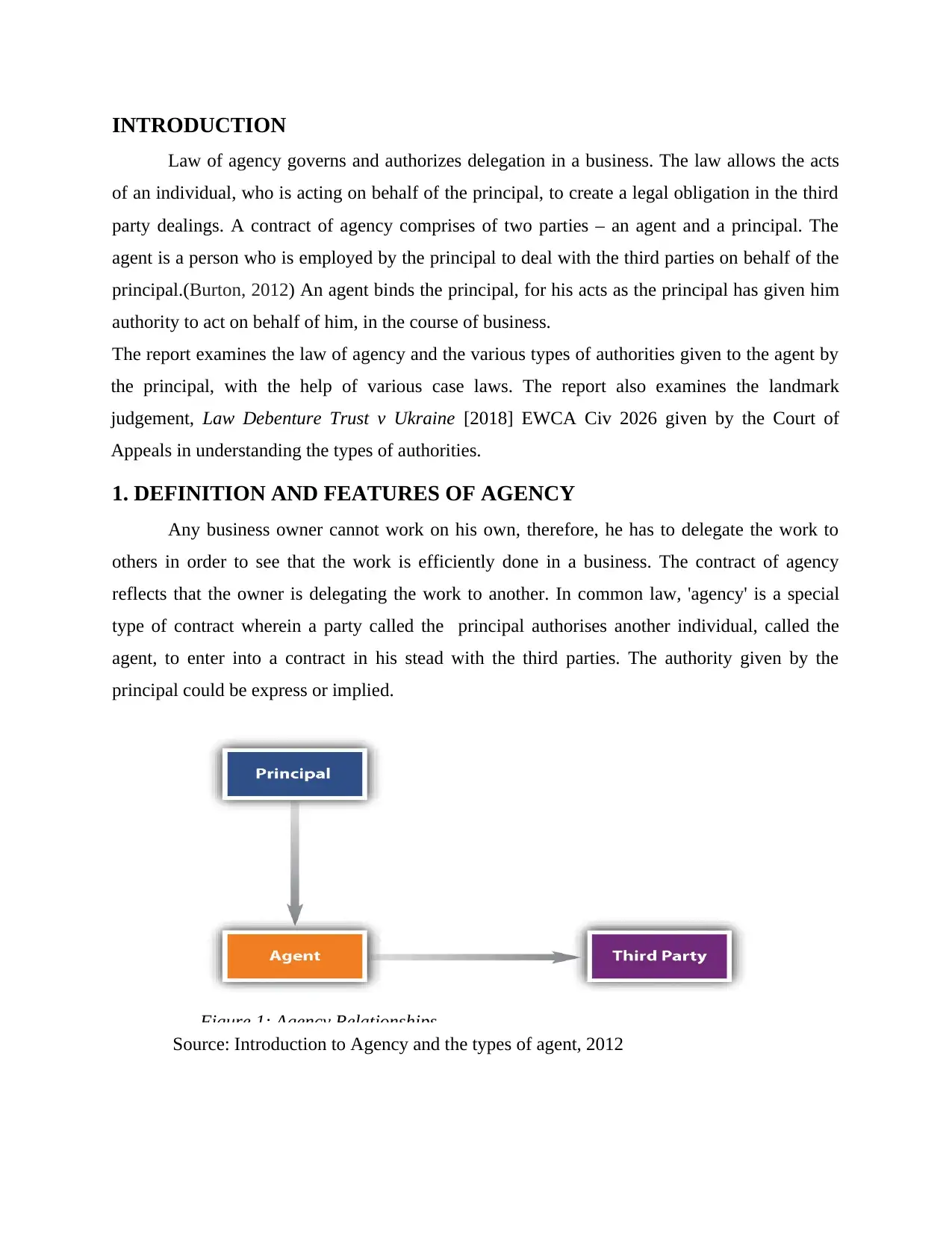
INTRODUCTION
Law of agency governs and authorizes delegation in a business. The law allows the acts
of an individual, who is acting on behalf of the principal, to create a legal obligation in the third
party dealings. A contract of agency comprises of two parties – an agent and a principal. The
agent is a person who is employed by the principal to deal with the third parties on behalf of the
principal.(Burton, 2012) An agent binds the principal, for his acts as the principal has given him
authority to act on behalf of him, in the course of business.
The report examines the law of agency and the various types of authorities given to the agent by
the principal, with the help of various case laws. The report also examines the landmark
judgement, Law Debenture Trust v Ukraine [2018] EWCA Civ 2026 given by the Court of
Appeals in understanding the types of authorities.
1. DEFINITION AND FEATURES OF AGENCY
Any business owner cannot work on his own, therefore, he has to delegate the work to
others in order to see that the work is efficiently done in a business. The contract of agency
reflects that the owner is delegating the work to another. In common law, 'agency' is a special
type of contract wherein a party called the principal authorises another individual, called the
agent, to enter into a contract in his stead with the third parties. The authority given by the
principal could be express or implied.
Source: Introduction to Agency and the types of agent, 2012
Figure 1: Agency Relationships
Law of agency governs and authorizes delegation in a business. The law allows the acts
of an individual, who is acting on behalf of the principal, to create a legal obligation in the third
party dealings. A contract of agency comprises of two parties – an agent and a principal. The
agent is a person who is employed by the principal to deal with the third parties on behalf of the
principal.(Burton, 2012) An agent binds the principal, for his acts as the principal has given him
authority to act on behalf of him, in the course of business.
The report examines the law of agency and the various types of authorities given to the agent by
the principal, with the help of various case laws. The report also examines the landmark
judgement, Law Debenture Trust v Ukraine [2018] EWCA Civ 2026 given by the Court of
Appeals in understanding the types of authorities.
1. DEFINITION AND FEATURES OF AGENCY
Any business owner cannot work on his own, therefore, he has to delegate the work to
others in order to see that the work is efficiently done in a business. The contract of agency
reflects that the owner is delegating the work to another. In common law, 'agency' is a special
type of contract wherein a party called the principal authorises another individual, called the
agent, to enter into a contract in his stead with the third parties. The authority given by the
principal could be express or implied.
Source: Introduction to Agency and the types of agent, 2012
Figure 1: Agency Relationships
⊘ This is a preview!⊘
Do you want full access?
Subscribe today to unlock all pages.

Trusted by 1+ million students worldwide
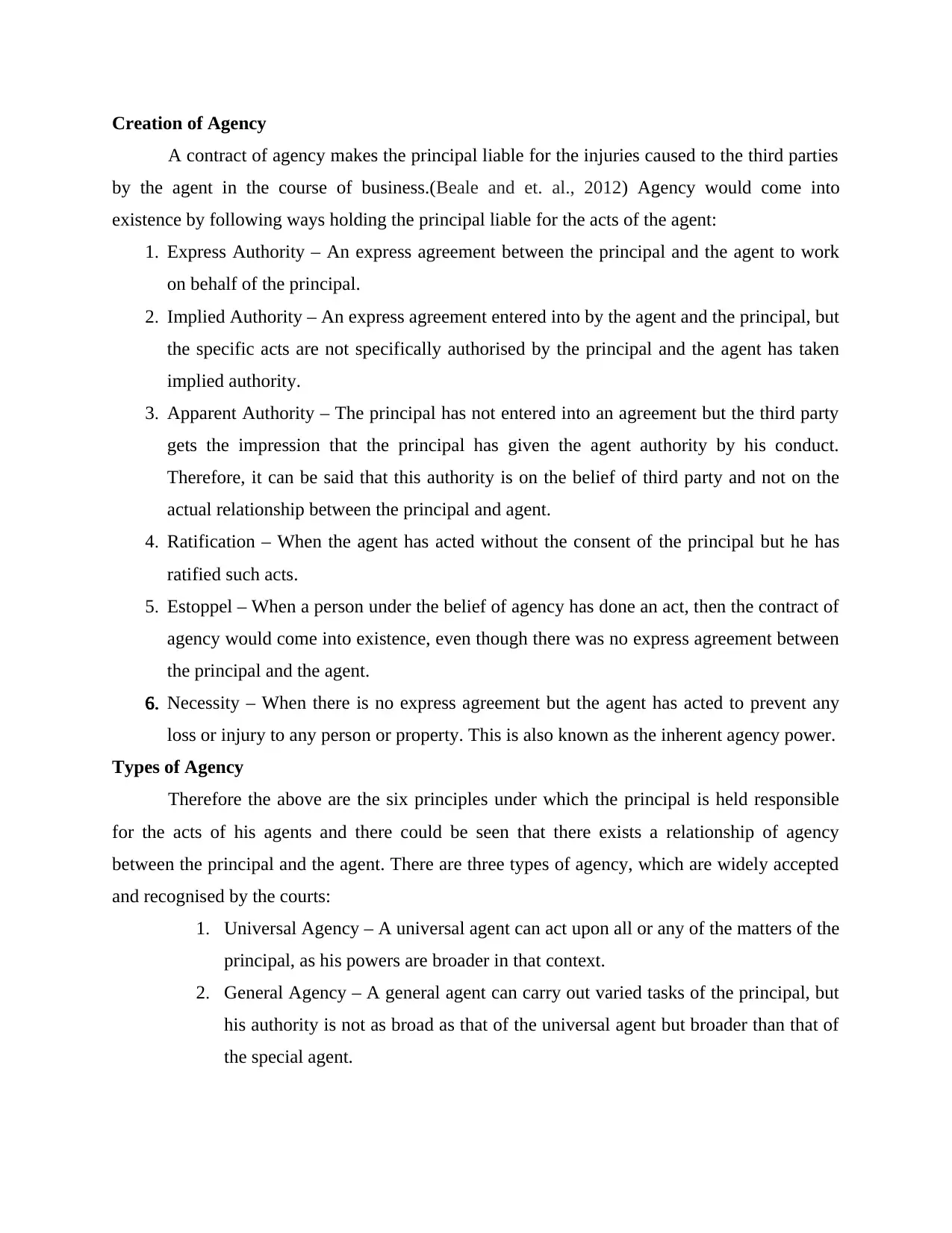
Creation of Agency
A contract of agency makes the principal liable for the injuries caused to the third parties
by the agent in the course of business.(Beale and et. al., 2012) Agency would come into
existence by following ways holding the principal liable for the acts of the agent:
1. Express Authority – An express agreement between the principal and the agent to work
on behalf of the principal.
2. Implied Authority – An express agreement entered into by the agent and the principal, but
the specific acts are not specifically authorised by the principal and the agent has taken
implied authority.
3. Apparent Authority – The principal has not entered into an agreement but the third party
gets the impression that the principal has given the agent authority by his conduct.
Therefore, it can be said that this authority is on the belief of third party and not on the
actual relationship between the principal and agent.
4. Ratification – When the agent has acted without the consent of the principal but he has
ratified such acts.
5. Estoppel – When a person under the belief of agency has done an act, then the contract of
agency would come into existence, even though there was no express agreement between
the principal and the agent.
6. Necessity – When there is no express agreement but the agent has acted to prevent any
loss or injury to any person or property. This is also known as the inherent agency power.
Types of Agency
Therefore the above are the six principles under which the principal is held responsible
for the acts of his agents and there could be seen that there exists a relationship of agency
between the principal and the agent. There are three types of agency, which are widely accepted
and recognised by the courts:
1. Universal Agency – A universal agent can act upon all or any of the matters of the
principal, as his powers are broader in that context.
2. General Agency – A general agent can carry out varied tasks of the principal, but
his authority is not as broad as that of the universal agent but broader than that of
the special agent.
A contract of agency makes the principal liable for the injuries caused to the third parties
by the agent in the course of business.(Beale and et. al., 2012) Agency would come into
existence by following ways holding the principal liable for the acts of the agent:
1. Express Authority – An express agreement between the principal and the agent to work
on behalf of the principal.
2. Implied Authority – An express agreement entered into by the agent and the principal, but
the specific acts are not specifically authorised by the principal and the agent has taken
implied authority.
3. Apparent Authority – The principal has not entered into an agreement but the third party
gets the impression that the principal has given the agent authority by his conduct.
Therefore, it can be said that this authority is on the belief of third party and not on the
actual relationship between the principal and agent.
4. Ratification – When the agent has acted without the consent of the principal but he has
ratified such acts.
5. Estoppel – When a person under the belief of agency has done an act, then the contract of
agency would come into existence, even though there was no express agreement between
the principal and the agent.
6. Necessity – When there is no express agreement but the agent has acted to prevent any
loss or injury to any person or property. This is also known as the inherent agency power.
Types of Agency
Therefore the above are the six principles under which the principal is held responsible
for the acts of his agents and there could be seen that there exists a relationship of agency
between the principal and the agent. There are three types of agency, which are widely accepted
and recognised by the courts:
1. Universal Agency – A universal agent can act upon all or any of the matters of the
principal, as his powers are broader in that context.
2. General Agency – A general agent can carry out varied tasks of the principal, but
his authority is not as broad as that of the universal agent but broader than that of
the special agent.
Paraphrase This Document
Need a fresh take? Get an instant paraphrase of this document with our AI Paraphraser
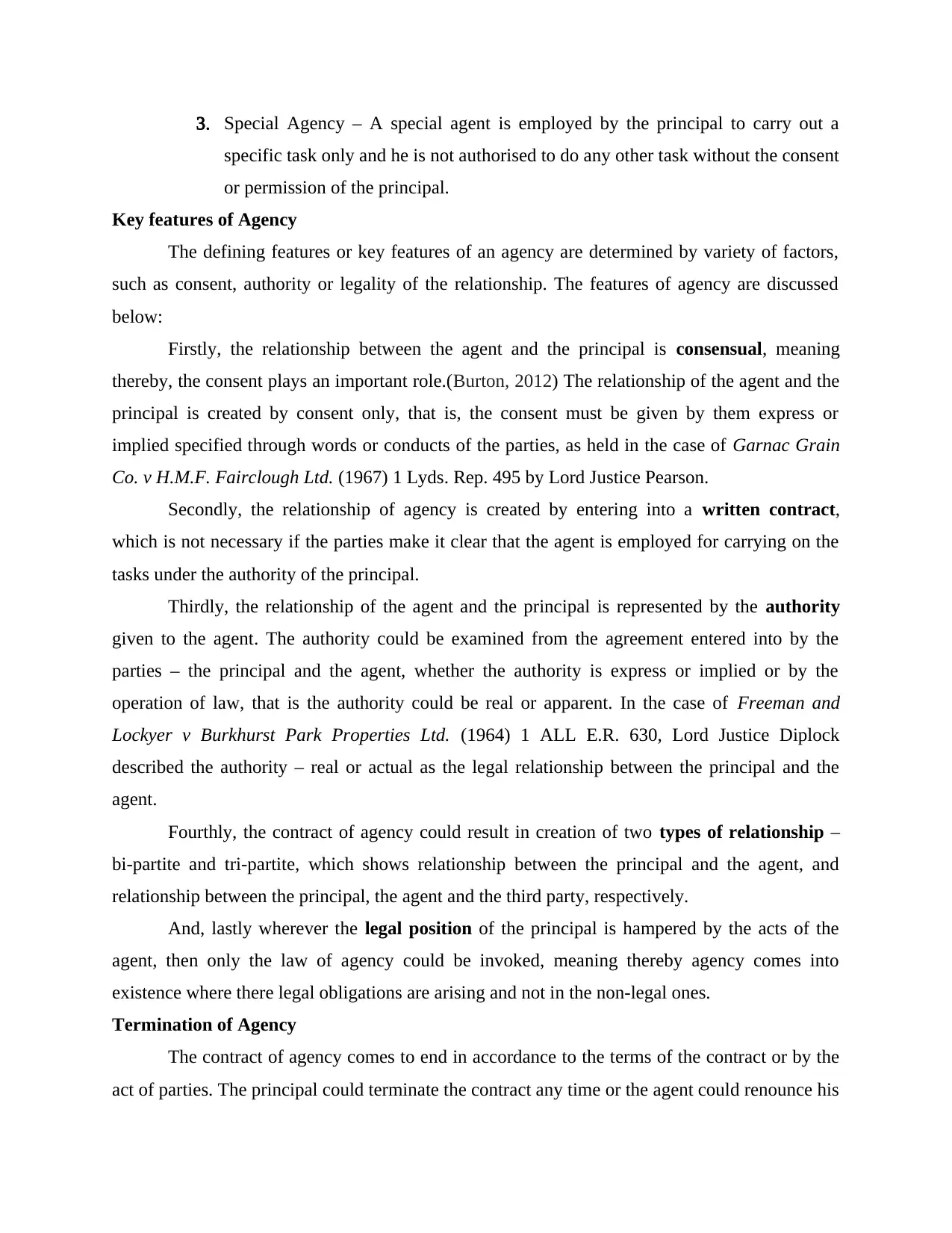
3. Special Agency – A special agent is employed by the principal to carry out a
specific task only and he is not authorised to do any other task without the consent
or permission of the principal.
Key features of Agency
The defining features or key features of an agency are determined by variety of factors,
such as consent, authority or legality of the relationship. The features of agency are discussed
below:
Firstly, the relationship between the agent and the principal is consensual, meaning
thereby, the consent plays an important role.(Burton, 2012) The relationship of the agent and the
principal is created by consent only, that is, the consent must be given by them express or
implied specified through words or conducts of the parties, as held in the case of Garnac Grain
Co. v H.M.F. Fairclough Ltd. (1967) 1 Lyds. Rep. 495 by Lord Justice Pearson.
Secondly, the relationship of agency is created by entering into a written contract,
which is not necessary if the parties make it clear that the agent is employed for carrying on the
tasks under the authority of the principal.
Thirdly, the relationship of the agent and the principal is represented by the authority
given to the agent. The authority could be examined from the agreement entered into by the
parties – the principal and the agent, whether the authority is express or implied or by the
operation of law, that is the authority could be real or apparent. In the case of Freeman and
Lockyer v Burkhurst Park Properties Ltd. (1964) 1 ALL E.R. 630, Lord Justice Diplock
described the authority – real or actual as the legal relationship between the principal and the
agent.
Fourthly, the contract of agency could result in creation of two types of relationship –
bi-partite and tri-partite, which shows relationship between the principal and the agent, and
relationship between the principal, the agent and the third party, respectively.
And, lastly wherever the legal position of the principal is hampered by the acts of the
agent, then only the law of agency could be invoked, meaning thereby agency comes into
existence where there legal obligations are arising and not in the non-legal ones.
Termination of Agency
The contract of agency comes to end in accordance to the terms of the contract or by the
act of parties. The principal could terminate the contract any time or the agent could renounce his
specific task only and he is not authorised to do any other task without the consent
or permission of the principal.
Key features of Agency
The defining features or key features of an agency are determined by variety of factors,
such as consent, authority or legality of the relationship. The features of agency are discussed
below:
Firstly, the relationship between the agent and the principal is consensual, meaning
thereby, the consent plays an important role.(Burton, 2012) The relationship of the agent and the
principal is created by consent only, that is, the consent must be given by them express or
implied specified through words or conducts of the parties, as held in the case of Garnac Grain
Co. v H.M.F. Fairclough Ltd. (1967) 1 Lyds. Rep. 495 by Lord Justice Pearson.
Secondly, the relationship of agency is created by entering into a written contract,
which is not necessary if the parties make it clear that the agent is employed for carrying on the
tasks under the authority of the principal.
Thirdly, the relationship of the agent and the principal is represented by the authority
given to the agent. The authority could be examined from the agreement entered into by the
parties – the principal and the agent, whether the authority is express or implied or by the
operation of law, that is the authority could be real or apparent. In the case of Freeman and
Lockyer v Burkhurst Park Properties Ltd. (1964) 1 ALL E.R. 630, Lord Justice Diplock
described the authority – real or actual as the legal relationship between the principal and the
agent.
Fourthly, the contract of agency could result in creation of two types of relationship –
bi-partite and tri-partite, which shows relationship between the principal and the agent, and
relationship between the principal, the agent and the third party, respectively.
And, lastly wherever the legal position of the principal is hampered by the acts of the
agent, then only the law of agency could be invoked, meaning thereby agency comes into
existence where there legal obligations are arising and not in the non-legal ones.
Termination of Agency
The contract of agency comes to end in accordance to the terms of the contract or by the
act of parties. The principal could terminate the contract any time or the agent could renounce his
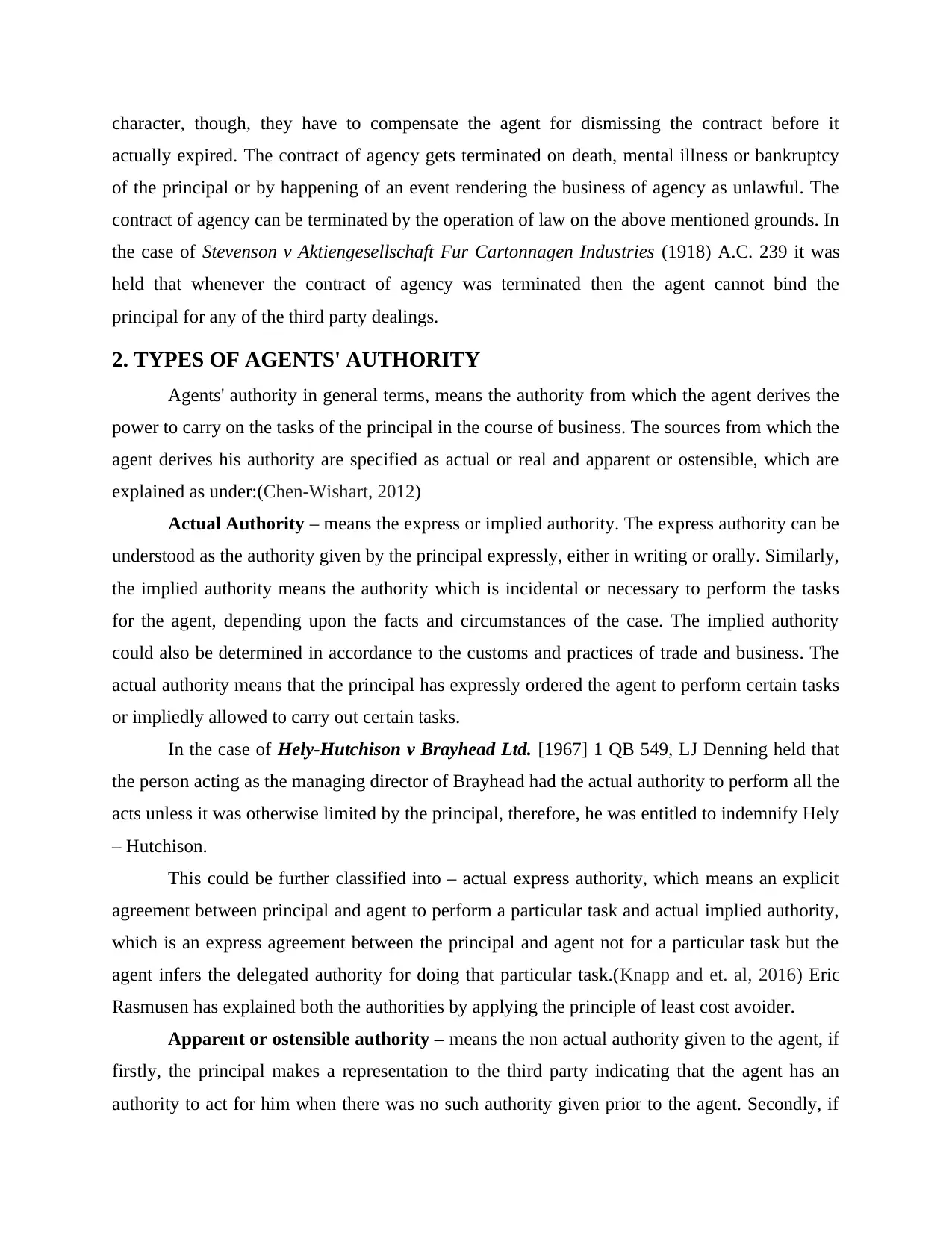
character, though, they have to compensate the agent for dismissing the contract before it
actually expired. The contract of agency gets terminated on death, mental illness or bankruptcy
of the principal or by happening of an event rendering the business of agency as unlawful. The
contract of agency can be terminated by the operation of law on the above mentioned grounds. In
the case of Stevenson v Aktiengesellschaft Fur Cartonnagen Industries (1918) A.C. 239 it was
held that whenever the contract of agency was terminated then the agent cannot bind the
principal for any of the third party dealings.
2. TYPES OF AGENTS' AUTHORITY
Agents' authority in general terms, means the authority from which the agent derives the
power to carry on the tasks of the principal in the course of business. The sources from which the
agent derives his authority are specified as actual or real and apparent or ostensible, which are
explained as under:(Chen-Wishart, 2012)
Actual Authority – means the express or implied authority. The express authority can be
understood as the authority given by the principal expressly, either in writing or orally. Similarly,
the implied authority means the authority which is incidental or necessary to perform the tasks
for the agent, depending upon the facts and circumstances of the case. The implied authority
could also be determined in accordance to the customs and practices of trade and business. The
actual authority means that the principal has expressly ordered the agent to perform certain tasks
or impliedly allowed to carry out certain tasks.
In the case of Hely-Hutchison v Brayhead Ltd. [1967] 1 QB 549, LJ Denning held that
the person acting as the managing director of Brayhead had the actual authority to perform all the
acts unless it was otherwise limited by the principal, therefore, he was entitled to indemnify Hely
– Hutchison.
This could be further classified into – actual express authority, which means an explicit
agreement between principal and agent to perform a particular task and actual implied authority,
which is an express agreement between the principal and agent not for a particular task but the
agent infers the delegated authority for doing that particular task.(Knapp and et. al, 2016) Eric
Rasmusen has explained both the authorities by applying the principle of least cost avoider.
Apparent or ostensible authority – means the non actual authority given to the agent, if
firstly, the principal makes a representation to the third party indicating that the agent has an
authority to act for him when there was no such authority given prior to the agent. Secondly, if
actually expired. The contract of agency gets terminated on death, mental illness or bankruptcy
of the principal or by happening of an event rendering the business of agency as unlawful. The
contract of agency can be terminated by the operation of law on the above mentioned grounds. In
the case of Stevenson v Aktiengesellschaft Fur Cartonnagen Industries (1918) A.C. 239 it was
held that whenever the contract of agency was terminated then the agent cannot bind the
principal for any of the third party dealings.
2. TYPES OF AGENTS' AUTHORITY
Agents' authority in general terms, means the authority from which the agent derives the
power to carry on the tasks of the principal in the course of business. The sources from which the
agent derives his authority are specified as actual or real and apparent or ostensible, which are
explained as under:(Chen-Wishart, 2012)
Actual Authority – means the express or implied authority. The express authority can be
understood as the authority given by the principal expressly, either in writing or orally. Similarly,
the implied authority means the authority which is incidental or necessary to perform the tasks
for the agent, depending upon the facts and circumstances of the case. The implied authority
could also be determined in accordance to the customs and practices of trade and business. The
actual authority means that the principal has expressly ordered the agent to perform certain tasks
or impliedly allowed to carry out certain tasks.
In the case of Hely-Hutchison v Brayhead Ltd. [1967] 1 QB 549, LJ Denning held that
the person acting as the managing director of Brayhead had the actual authority to perform all the
acts unless it was otherwise limited by the principal, therefore, he was entitled to indemnify Hely
– Hutchison.
This could be further classified into – actual express authority, which means an explicit
agreement between principal and agent to perform a particular task and actual implied authority,
which is an express agreement between the principal and agent not for a particular task but the
agent infers the delegated authority for doing that particular task.(Knapp and et. al, 2016) Eric
Rasmusen has explained both the authorities by applying the principle of least cost avoider.
Apparent or ostensible authority – means the non actual authority given to the agent, if
firstly, the principal makes a representation to the third party indicating that the agent has an
authority to act for him when there was no such authority given prior to the agent. Secondly, if
⊘ This is a preview!⊘
Do you want full access?
Subscribe today to unlock all pages.

Trusted by 1+ million students worldwide

the third party has acted on the basis of the representation made by the principal. And, if the third
party alters the position relying on the conduct of the principal. It can be said that the apparent or
ostensible form of authority is created on the principles of estoppel, wherein the principal
induces the third party to believe that there is a relationship of agency between him and the
agent, when there is no such relationship existing. And, if such third party acts upon the
inducement, then the principal will be estopped and not allowed to divert from the fact that such
a contract is not binding upon him.
In the case of Freeman and Lockyer v Burkhurst Park Properties Ltd. (1964) 1 ALL
E.R. 630, the actual authority was described by the LJ Diplock. The case was filed by the
plaintiff who authorised an agent to work for the defendant, even though there was no express
contract between the principal and the agent. The defendant allowed the agent to work but when
it came to making payments then the defendant refused the agent stating that he never had
authority. The court held that the defendant could not refuse to pay the agent on the basis of the
principle of estoppel, as he had knowledge that the agent was working on behalf of the principal.
3. ACTUAL AUTHORITY v APPARENT AUTHORITY
There is a distinction between apparent authority and actual authority in the law of
agency. It could be said that the apparent or ostensible authority is a subtle form of authority,
which does not involve any official grant of authority to carry on any act or task. Wherein the
actual authority is for granting power to another person for performing any task on behalf of the
company, corporation, etc., which is known as the principal.(Friedman, 2011) The status of the
acts taken under apparent authority may differ and may not always be legally binding. The
apparent or ostensible authority applies to all those acts which an ordinary prudent person or a
reasonable person would carry out in the natural course of business, depending upon the general
customs and practices carried out in a business or trade.
The case laws are helpful in understanding the differences in between the two – actual
and apparent. The Freeman case describes the status of actual authority. The details of the case
clearly states that even if the principal and the agent does not have any express agreement but
still if the conduct of the principal is such which reflects that there exists a relationship of agency
and the third party acts on the basis of such conduct, then later on the existence of agency could
not be questioned. Similarly, in the case of Hely-Hutchison the authority was driven from the
virtue of the office of managing director unless there are certain limitation put on the post itself.
party alters the position relying on the conduct of the principal. It can be said that the apparent or
ostensible form of authority is created on the principles of estoppel, wherein the principal
induces the third party to believe that there is a relationship of agency between him and the
agent, when there is no such relationship existing. And, if such third party acts upon the
inducement, then the principal will be estopped and not allowed to divert from the fact that such
a contract is not binding upon him.
In the case of Freeman and Lockyer v Burkhurst Park Properties Ltd. (1964) 1 ALL
E.R. 630, the actual authority was described by the LJ Diplock. The case was filed by the
plaintiff who authorised an agent to work for the defendant, even though there was no express
contract between the principal and the agent. The defendant allowed the agent to work but when
it came to making payments then the defendant refused the agent stating that he never had
authority. The court held that the defendant could not refuse to pay the agent on the basis of the
principle of estoppel, as he had knowledge that the agent was working on behalf of the principal.
3. ACTUAL AUTHORITY v APPARENT AUTHORITY
There is a distinction between apparent authority and actual authority in the law of
agency. It could be said that the apparent or ostensible authority is a subtle form of authority,
which does not involve any official grant of authority to carry on any act or task. Wherein the
actual authority is for granting power to another person for performing any task on behalf of the
company, corporation, etc., which is known as the principal.(Friedman, 2011) The status of the
acts taken under apparent authority may differ and may not always be legally binding. The
apparent or ostensible authority applies to all those acts which an ordinary prudent person or a
reasonable person would carry out in the natural course of business, depending upon the general
customs and practices carried out in a business or trade.
The case laws are helpful in understanding the differences in between the two – actual
and apparent. The Freeman case describes the status of actual authority. The details of the case
clearly states that even if the principal and the agent does not have any express agreement but
still if the conduct of the principal is such which reflects that there exists a relationship of agency
and the third party acts on the basis of such conduct, then later on the existence of agency could
not be questioned. Similarly, in the case of Hely-Hutchison the authority was driven from the
virtue of the office of managing director unless there are certain limitation put on the post itself.
Paraphrase This Document
Need a fresh take? Get an instant paraphrase of this document with our AI Paraphraser
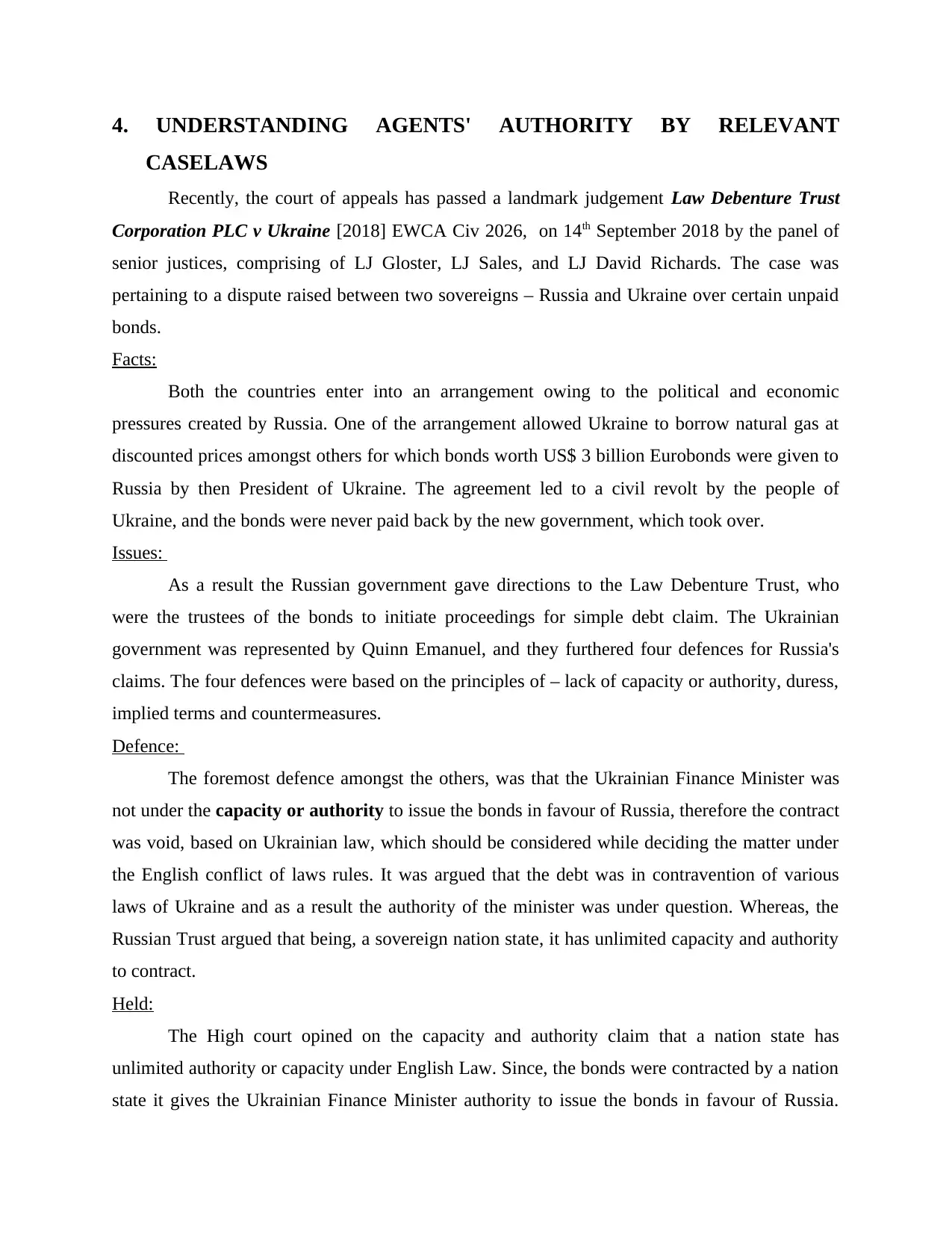
4. UNDERSTANDING AGENTS' AUTHORITY BY RELEVANT
CASELAWS
Recently, the court of appeals has passed a landmark judgement Law Debenture Trust
Corporation PLC v Ukraine [2018] EWCA Civ 2026, on 14th September 2018 by the panel of
senior justices, comprising of LJ Gloster, LJ Sales, and LJ David Richards. The case was
pertaining to a dispute raised between two sovereigns – Russia and Ukraine over certain unpaid
bonds.
Facts:
Both the countries enter into an arrangement owing to the political and economic
pressures created by Russia. One of the arrangement allowed Ukraine to borrow natural gas at
discounted prices amongst others for which bonds worth US$ 3 billion Eurobonds were given to
Russia by then President of Ukraine. The agreement led to a civil revolt by the people of
Ukraine, and the bonds were never paid back by the new government, which took over.
Issues:
As a result the Russian government gave directions to the Law Debenture Trust, who
were the trustees of the bonds to initiate proceedings for simple debt claim. The Ukrainian
government was represented by Quinn Emanuel, and they furthered four defences for Russia's
claims. The four defences were based on the principles of – lack of capacity or authority, duress,
implied terms and countermeasures.
Defence:
The foremost defence amongst the others, was that the Ukrainian Finance Minister was
not under the capacity or authority to issue the bonds in favour of Russia, therefore the contract
was void, based on Ukrainian law, which should be considered while deciding the matter under
the English conflict of laws rules. It was argued that the debt was in contravention of various
laws of Ukraine and as a result the authority of the minister was under question. Whereas, the
Russian Trust argued that being, a sovereign nation state, it has unlimited capacity and authority
to contract.
Held:
The High court opined on the capacity and authority claim that a nation state has
unlimited authority or capacity under English Law. Since, the bonds were contracted by a nation
state it gives the Ukrainian Finance Minister authority to issue the bonds in favour of Russia.
CASELAWS
Recently, the court of appeals has passed a landmark judgement Law Debenture Trust
Corporation PLC v Ukraine [2018] EWCA Civ 2026, on 14th September 2018 by the panel of
senior justices, comprising of LJ Gloster, LJ Sales, and LJ David Richards. The case was
pertaining to a dispute raised between two sovereigns – Russia and Ukraine over certain unpaid
bonds.
Facts:
Both the countries enter into an arrangement owing to the political and economic
pressures created by Russia. One of the arrangement allowed Ukraine to borrow natural gas at
discounted prices amongst others for which bonds worth US$ 3 billion Eurobonds were given to
Russia by then President of Ukraine. The agreement led to a civil revolt by the people of
Ukraine, and the bonds were never paid back by the new government, which took over.
Issues:
As a result the Russian government gave directions to the Law Debenture Trust, who
were the trustees of the bonds to initiate proceedings for simple debt claim. The Ukrainian
government was represented by Quinn Emanuel, and they furthered four defences for Russia's
claims. The four defences were based on the principles of – lack of capacity or authority, duress,
implied terms and countermeasures.
Defence:
The foremost defence amongst the others, was that the Ukrainian Finance Minister was
not under the capacity or authority to issue the bonds in favour of Russia, therefore the contract
was void, based on Ukrainian law, which should be considered while deciding the matter under
the English conflict of laws rules. It was argued that the debt was in contravention of various
laws of Ukraine and as a result the authority of the minister was under question. Whereas, the
Russian Trust argued that being, a sovereign nation state, it has unlimited capacity and authority
to contract.
Held:
The High court opined on the capacity and authority claim that a nation state has
unlimited authority or capacity under English Law. Since, the bonds were contracted by a nation
state it gives the Ukrainian Finance Minister authority to issue the bonds in favour of Russia.
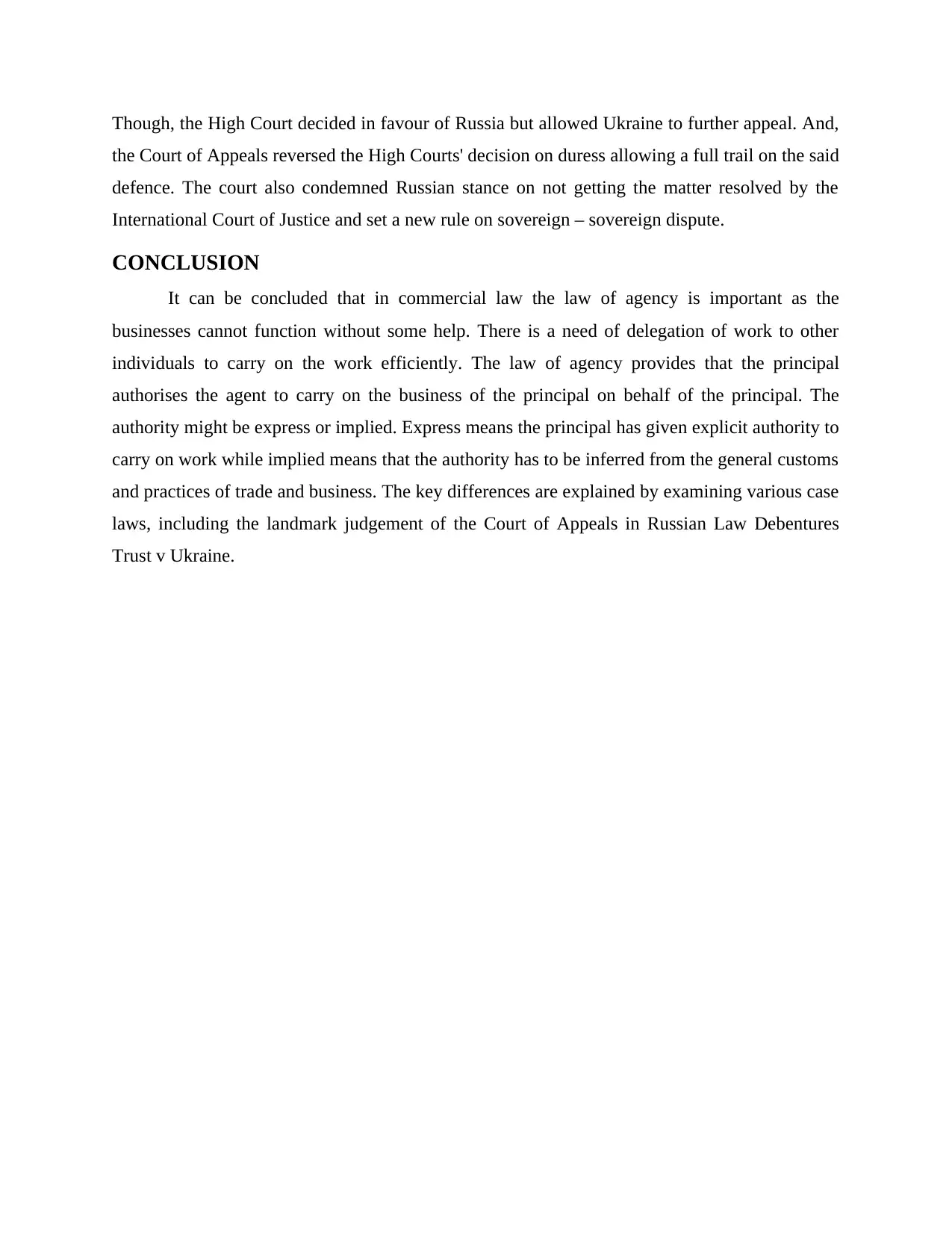
Though, the High Court decided in favour of Russia but allowed Ukraine to further appeal. And,
the Court of Appeals reversed the High Courts' decision on duress allowing a full trail on the said
defence. The court also condemned Russian stance on not getting the matter resolved by the
International Court of Justice and set a new rule on sovereign – sovereign dispute.
CONCLUSION
It can be concluded that in commercial law the law of agency is important as the
businesses cannot function without some help. There is a need of delegation of work to other
individuals to carry on the work efficiently. The law of agency provides that the principal
authorises the agent to carry on the business of the principal on behalf of the principal. The
authority might be express or implied. Express means the principal has given explicit authority to
carry on work while implied means that the authority has to be inferred from the general customs
and practices of trade and business. The key differences are explained by examining various case
laws, including the landmark judgement of the Court of Appeals in Russian Law Debentures
Trust v Ukraine.
the Court of Appeals reversed the High Courts' decision on duress allowing a full trail on the said
defence. The court also condemned Russian stance on not getting the matter resolved by the
International Court of Justice and set a new rule on sovereign – sovereign dispute.
CONCLUSION
It can be concluded that in commercial law the law of agency is important as the
businesses cannot function without some help. There is a need of delegation of work to other
individuals to carry on the work efficiently. The law of agency provides that the principal
authorises the agent to carry on the business of the principal on behalf of the principal. The
authority might be express or implied. Express means the principal has given explicit authority to
carry on work while implied means that the authority has to be inferred from the general customs
and practices of trade and business. The key differences are explained by examining various case
laws, including the landmark judgement of the Court of Appeals in Russian Law Debentures
Trust v Ukraine.
⊘ This is a preview!⊘
Do you want full access?
Subscribe today to unlock all pages.

Trusted by 1+ million students worldwide

REFERENCES
Books and Journals
Beale, H. and et. al., 2012. Contract law (pp. 312-13). Hart.
Burton, S.J., 2012. Principles of contract law.
Chen-Wishart, M., 2012. Contract law. Oxford University Press.
Friedman, L.M., 2011. Contract law in America: a social and economic case study. Quid Pro
Books.
Furmston, M.P., and et. al., 2012. Cheshire, Fifoot and Furmston's law of contract. Oxford
University Press.
Heracleous, L. and et. al., 2012. Agency theory, institutional sensitivity, and inductive reasoning:
Towards a legal perspective. Journal of Management Studies, 49(1). pp.223-239.
Knapp, C.L., and et. al, 2016. Problems in Contract Law: cases and materials. Wolters Kluwer
Law & Business.
McKendrick, E., 2014. ontract law: text, cases, and materials. Oxford University Press (UK).
Peel, E., 2015. Treitel on the Law of Contract (Vol. 414). London: Sweet & maxwell.
Poole, J., 2014. Casebook on contract law. Oxford University Press, USA.
Books and Journals
Beale, H. and et. al., 2012. Contract law (pp. 312-13). Hart.
Burton, S.J., 2012. Principles of contract law.
Chen-Wishart, M., 2012. Contract law. Oxford University Press.
Friedman, L.M., 2011. Contract law in America: a social and economic case study. Quid Pro
Books.
Furmston, M.P., and et. al., 2012. Cheshire, Fifoot and Furmston's law of contract. Oxford
University Press.
Heracleous, L. and et. al., 2012. Agency theory, institutional sensitivity, and inductive reasoning:
Towards a legal perspective. Journal of Management Studies, 49(1). pp.223-239.
Knapp, C.L., and et. al, 2016. Problems in Contract Law: cases and materials. Wolters Kluwer
Law & Business.
McKendrick, E., 2014. ontract law: text, cases, and materials. Oxford University Press (UK).
Peel, E., 2015. Treitel on the Law of Contract (Vol. 414). London: Sweet & maxwell.
Poole, J., 2014. Casebook on contract law. Oxford University Press, USA.
1 out of 10
Related Documents
Your All-in-One AI-Powered Toolkit for Academic Success.
+13062052269
info@desklib.com
Available 24*7 on WhatsApp / Email
![[object Object]](/_next/static/media/star-bottom.7253800d.svg)
Unlock your academic potential
Copyright © 2020–2026 A2Z Services. All Rights Reserved. Developed and managed by ZUCOL.





